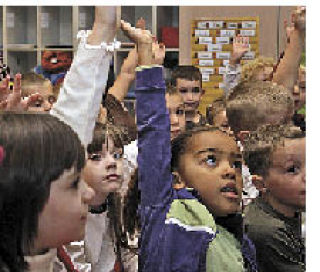Success in school starts long before a child enters the classroom. We know that families lay the foundation for all future learning by spending time with their child, doing lots of talking and reading stories aloud. But families often wonder what a typical 5-year-old knows, or should know, the first day of school. There are readiness skills for kindergarten, which are not requirements, but learning goals. Not every child will hit every goal – a child may be high on some skills and low on others, but what we do know is children who are taught these skills at home by their families get off to a great start at school. Studies show that student who start ahead, stay ahead, year after year.
Today, only 50 percent of kindergarteners nationwide are fully ready. This means many children are one to two years behind their classmates the first day of school. Such a large difference is extremely hard to overcome. Even though kindergarten teachers try their best to make readers of all children, it is often impossible for unprepared students to close the readiness gap in one year while half the class continues to leap ahead in reading and learning. Students who are not prepared for school struggle for years to catch up and many never do.
During the past several years, teachers, school principals and administrators in the Sumner School District have worked collaboratively with families, preschools, childcare providers and other community partners, to develop an early learning initiative. Together, we are committed to ensuring that parents and caregivers will have access to the support, information and services they need, including quality early learning opportunities for their children.
One of the programs we offer to families with children ages 2 through 5 is READY! for Kindergarten. This free series of classes, taught by Sumner School District teachers, helps parents get their children ready for school. The classes provide activities designed by teachers to help children acquire critical pre-literacy and pre-math skills.
Parents, not the child, attend 90-minute classes, based on the age of their child. All parents get activities, books and other learning toys to enjoy at home with their child. All classes are free to parents living in the Sumner School District. If you reside outside of Sumner School District boundaries, there is a nominal materials fee.
New this year is our Early Learning Resource Room at Crestwood Elementary School. The Resource Room provides free resources to parents, childcare providers and preschool teachers and is open 9 to 11 a.m. and 4 to 5:30 p.m. Tuesdays and 9 to 11 a.m. Thursdays. Stop by for more information about kindergarten readiness, to sign up for classes, to learn more about activities for young children and parenting information, or to visit our Early Learning Lending Library.
When children enter kindergarten with age-appropriate literacy skills they are ready for a successful and happy education. If you are interested in more information or would like to attend a Ready! class, contact Laurie Sjolund at 253-891-4560 or visit the Sumner School District Web site at www.sumner.wednet.edu.
Kindergarten Learning Targets
Letters and Sounds
• enjoy being read to and can retell a story
• recognize and name 10-15 alphabet letters and their sounds
• repeat beginning and ending sounds in words
• speak in complete sentences
• print his or her first name
Math
• count in order from 1 to 20
• recognize numbers and quantities to 10
• name and sort items by color, shape and size
• understand concepts such as more, less, same, above, below, big and small
Social
• settle into new groups or situations
• can concentrate on a task for 5 minutes
• follow simple directions
• show kindness and concern for others
“The single most important activity for building the knowledge required for eventual success in reading is reading aloud to our children. This is especially so during the preschool years.”
– Becoming a Nation of Readers: The report of the Commission on Reading


